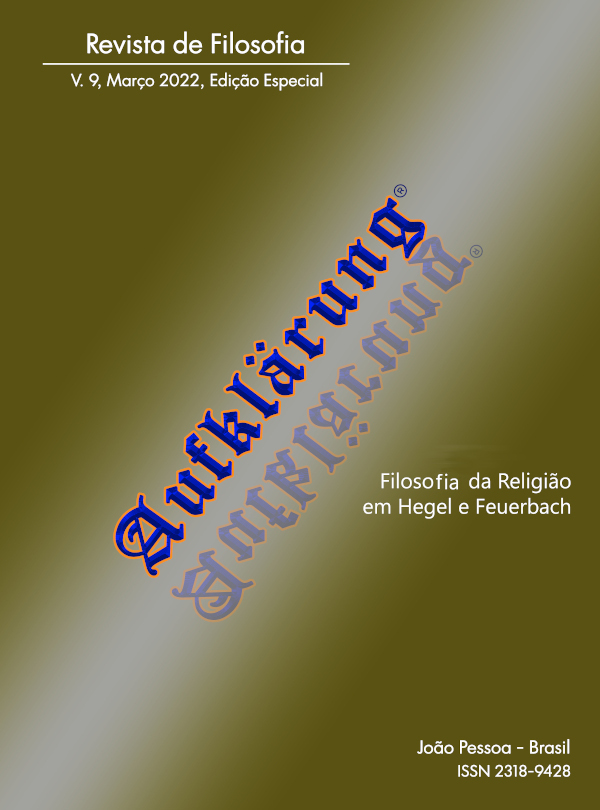The Community in Hegelian Consummated Religion from the Ubuntu and Love Concepts
DOI:
https://doi.org/10.18012/arf.v9iesp.62071Keywords:
Community, Bantu, Love, Intersubjectivity, ReconciliationAbstract
The present article entitled, The community in the Hegelian Consummate Religion from the concepts of Ubuntu and Love, aims to understand how a human being (munthu) participates in the community under the aegis of the Spirit. This Spirit for Hegel is the community; it´s the consciousness of God that exists and is realized in the relationship between God-Father and God-Son. The core for apprehending the customs and institutions of the Bantu human being is the unity of life with the community whose mediator is the Spirit (muzimu); this is associated with a single principle in the munthu, -the participation. Ontologically, the Bantu is in a vital and intersubjective union with the ancestors, the living and those who are yet to be born in the community, which leads to a religious practice. The Bantus have the notion of absolute Spirit in the foreground; the source and fullness of life. Therefore, life is the greatest gift. The ancestors received it from an absolute Being, to communicate and defend it in the community. The Spirit, being dynamic, permeates the entire universe, on the basis of love and reconciliation that takes place in an intersubjective relationship, in a real way.
Downloads
References
AAVV, A Bíblia de Jerusalém, Editora Paulus, São Paulo, 1985.
ALTUNA, Pé. Raul Ruiz de Asúa. Cultura Tradicional Bantu, Portugal, 2ª edição, Editora Paulinas, 2014.
FEUERBACH, Ludwig. A Essência do Cristianismo, Trad. José da Silva Brandão, Rio de Janeiro-Petrópolis, Editora Vozes, 2007.
HEGEL, G. W. F., Filosofía de la religión, traducción Ricardo Ferrara, Madrid, Editorial Trotta, S.A., 2018
HEGEL, G. W. F. Enciclopédia das ciências filosóficas em epítome. Vol. 1 – A Ciência da Lógica. Trad. Paulo Menezes. São Paulo: Edições Loyola. 2005.
HEGEL, G. W. F. Fé e Saber, Trad. Oliver Tolle, São Paulo, Editora Hedra, 2007.
HEGEL, G. W. F. Fenomenologia do Espírito. Trad. Paulo Meneses, são Paulo, Vol, único, 2ª Edição, Editora Vozes, 2003.
LOUW, Dirk. “Ser por meio dos outros: o ubuntu como cuidado e partilha”, In Revista do Instituto Humanitas Unisinos, Edição 353, ano X, de 06 de dezembro de 2010.
LO.UW, Dirk Ubuntu: uma avaliação africana do outro religioso, África do Sul, Universidade do Norte, Paideia, 1997, Pp. 1-11.
MARTINEZ, Francisco Lerma. Religiões Africanas hoje: Introdução ao estudo das Religiões Tradicionais em Moçambique, 3ª Edição, Maputo, Editora Paulinas, 2009.
NOGUERA, Renato. Ubuntu como modo de Existir: Elementos gerais para uma ética afroperspectivista, Rio de Janeiro, Revista da ABPN, vol. 3, nº. 6, fev. 2012, p. 147-150
RABUSKE, Edvino. Antropologia Filosófica: um estudo sistemático, Petropolis, 8ª Edição, Editora Vozes, 2001.
RAMOSE, Mogobe B. A Filosofia do Ubuntu e Ubuntu como uma Filosofia, In: African Philosophy through Ubuntu. Tradução de Arnaldo Vasconcellos. Harare: Mond Books, 1999, Pp. 49-66. Artigo acessado em https://www. Scielo.br no dia 01.12.2020.
TUTU, Desmond. Deus não é cristão: e outras provocações. Trad. Lilian Jankino, Rio de Janeiro, Editora Thomas Nelson Brasil, 2012.
VAZ, Henrique Claudio Lima. Antropologia Filosófica I, São Paulo, Editora Loyola, 1991.
Additional Files
Published
How to Cite
Issue
Section
License

This work is licensed under a Creative Commons Attribution 4.0 International License.
Journal general policy
1.This journal works under a Creative Commons License aplied to online journals. That icence can be read in the following link: Creative Commons Attribution 4.0 International (CC BY 4.0).
2.Accordingly to this License, a)the journal declares that authors hold the copyright of their articles without restrictions, and they can archieve them as post-print elsewhere. b)the journal allow the author(s) to retain publishing rights without restrictions.
Metadata Policy for information describing items in the repository
1. Anyone may access the metadata free of charge at anytime.
2.The metadata may be re-used in any medium without prior permission, even commercial purposes provided the OAI Identifier or a link to the original metadata record are given, under the terms of a CC BY license refered for the Journal.







































